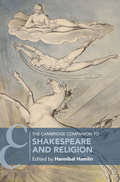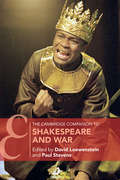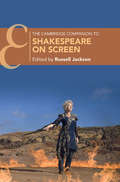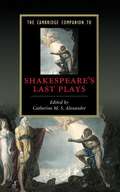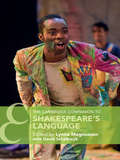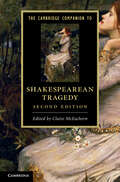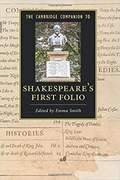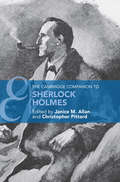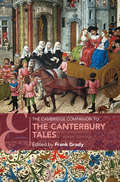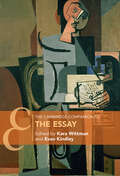- Table View
- List View
The Cambridge Companion to Shakespeare and Religion (Cambridge Companions to Literature)
by Hannibal HamlinNothing in Shakespeare's England was as important as religion. Questions of faith informed everything from history and politics to love and family, work and play, good and evil, suffering and sacrifice, and ultimately life and death. Every one of Shakespeare's plays is rich in allusions to the Bible, church rites including baptism, communion, marriage, and burial, and a host of religious beliefs. This Companion provides an essential grounding in early modern religious history and culture and the ideas that Shakespeare returns to throughout his career. Chapters dedicated to close-readings of individual plays or groups of plays span both the complex and variegated Christian beliefs explored in Shakespeare's work, as well as the treatment of Judaism, Islam and classical paganism. Authored by an international team of eminent scholars and featuring an Afterword by Rowan Williams, this Companion is the most comprehensive and incisive guide to the topic that students will find.
The Cambridge Companion to Shakespeare and War (Cambridge Companions to Literature)
by David Loewenstein Paul StevensWritten by a team of leading international scholars, The Cambridge Companion to Shakespeare and War illuminates the ways Shakespeare's works provide a rich and imaginative resource for thinking about the topic of war. Contributors explore the multiplicity of conflicting perspectives his dramas offer: war depicted from chivalric, masculine, nationalistic, and imperial perspectives; war depicted as a source of great excitement and as a theater of honor; war depicted from realistic or skeptical perspectives that expose the butchery, suffering, illness, famine, degradation, and havoc it causes. The essays in this volume examine the representations and rhetoric of war throughout Shakespeare's plays, as well as the modern history of the war plays on stage, in film, and in propaganda. This book offers fresh perspectives on Shakespeare's multifaceted representations of the complexities of early modern warfare, while at the same time illuminating why his perspectives on war and its consequences continue to matter now and in the future.
The Cambridge Companion to Shakespeare on Screen (Cambridge Companions to Literature)
by Jackson RussellThe Cambridge Companion to Shakespeare on Screen provides a lively guide to film and television productions adapted from Shakespeare's plays. Offering an essential resource for students of Shakespeare, the companion considers topics such as the early history of Shakespeare films, the development of 'live' broadcasts from theatre to cinema, the influence of promotion and marketing, and the range of versions available in 'world cinema'. Chapters on the contexts, genres and critical issues of Shakespeare on screen offer a diverse range of close analyses, from 'Classical Hollywood' films to the BBC's Hollow Crown series. The companion also features sections on the work of individual directors Orson Welles, Akira Kurosawa, Franco Zeffirelli, Kenneth Branagh, and Vishal Bhardwaj, and is supplemented by a guide to further reading and a filmography.
The Cambridge Companion to Shakespeare'S Last Plays
by Catherine M. S. AlexanderWhich plays are included under the heading 'Shakespeare's last plays', and when does Shakespeare's 'last' period begin? What is meant by a 'late play', and what are the benefits in defining plays in this way? Reflecting the recent growth of interest in late studies, and recognising the gaps in accessible scholarship on this area, in this 2009 book leading international Shakespeare scholars address these and many other questions. The essays locate Shakespeare's last plays - single and co-authored - in the period of their composition, consider the significant characteristics of their Jacobean context, and explore the rich afterlives, on stage, in print and other media of The Winter's Tale, Cymbeline, The Tempest, Pericles, The Two Noble Kinsmen and Henry VIII. The volume opens with a historical timeline that places the plays in the contexts of contemporary political events, theatrical events, other cultural milestones, Shakespeare's life and that of his playing company, the King's Men.
The Cambridge Companion to Shakespeare's History Plays
by Michael HattawayShakespeare's history plays have been performed more in recent years than ever before, in Britain, North America, and in Europe. This 2002 volume provides an accessible, wide-ranging and informed introduction to Shakespeare's history and Roman plays. It is attentive throughout to the plays as they have been performed over the centuries since they were written. The first part offers accounts of the genre of the history play, of Renaissance historiography, of pageants and masques, and of women's roles, as well as comparisons with history plays in Spain and the Netherlands. Chapters in the second part look at individual plays as well as other Shakespearean texts which are closely related to the histories. The Companion offers a full bibliography, genealogical tables, and a list of principal and recurrent characters. It is a comprehensive guide for students, researchers and theatre-goers alike.
The Cambridge Companion to Shakespeare's Language (Cambridge Companions to Literature)
by David Schalkwyk Lynne MagnussonThe power of Shakespeare's complex language - his linguistic playfulness, poetic diction and dramatic dialogue - inspires and challenges students, teachers, actors and theatre-goers across the globe. It has iconic status and enormous resonance, even as language change and the distance of time render it more opaque and difficult. The Cambridge Companion to Shakespeare's Language provides important contexts for understanding Shakespeare's experiments with language and offers accessible approaches to engaging with it directly and pleasurably. Incorporating both practical analysis and exemplary readings of Shakespearean passages, it covers elements of style, metre, speech action and dialogue; examines the shaping contexts of rhetorical education and social language; test-drives newly available digital methodologies and technologies; and considers Shakespeare's language in relation to performance, translation and popular culture. The Companion explains the present state of understanding while identifying opportunities for fresh discovery, leaving students equipped to ask productive questions and try out innovative methods.
The Cambridge Companion to Shakespeare's Poetry
by Patrick CheneyThis Companion provides a full introduction to the poetry of William Shakespeare through discussion of his freestanding narrative poems, the Sonnets, and his plays. Fourteen leading international scholars provide accessible and authoritative chapters on all relevant topics: from Shakespeare's seminal role in the development of English poetry, the wide-ranging practice of his poetic form, and his enigmatic place in print and manuscript culture, to his immersion in English Renaissance politics, religion, classicism, and gender dynamics. With individual chapters on Venus and Adonis, The Rape of Lucrece, The Passionate Pilgrim, 'The Phoenix and the Turtle', the Sonnets, and A Lover's Complaint, the Companion also includes chapters on the presence of poetry in the dramatic works, on the relation between poetry and performance, and on the reception and influence of the poems. The volume includes a chronology of Shakespeare's life, a note on reference works, and a reading list for each chapter.
The Cambridge Companion to Shakespearean Comedy
by Alexander LeggattThis is an accessible, wide-ranging and informed introduction to Shakespeare's comedies and romances. Rather than taking each play in isolation, the chapters trace recurring issues, suggesting both the continuity and the variety of Shakespeare's practice and the creative use he made of the conventions he inherited. The first section puts Shakespeare in the context of classical and Renaissance comedy and comic theory, the work of his Elizabethan predecessors and the traditions of popular festivity. The second section traces a number of themes through Shakespeare's early and middle comedies, dark comedies and late romances, establishing the key features of his comedy as a whole and illuminating particular plays by close analysis. Individual chapters draw on contemporary politics, rhetoric, and the history of Shakespeare production. Written by experts in the relevant fields, the chapters bring the reader up to date on current thinking and frequently challenge long-standing critical assumptions.
The Cambridge Companion to Shakespearean Tragedy
by Claire MceachernThis Companion acquaints the student reader with the forms, contexts, critical and theatrical lives of ten Shakespearean tragedies. It includes the four major tragedies and Titus Andronicus, Romeo and Juliet, Julius Caesar, Antony and Cleopatra, Coriolanus and Timon of Athens. Chapters on a demanding theatrical genre are clear, concise and informative. They consider how Shakespearean tragedy originated, developed and diversified; and how it has fared in performance.
The Cambridge Companion to Shakespeare’s First Folio
by Emma SmithShakespeare's First Folio, published in 1623, is one of the world's most studied books, prompting speculation about everything from proof-reading practices in the early modern publishing industry to the 'true' authorship of Shakespeare's plays. Arguments about the nature of the First Folio are crucial to every modern edition of Shakespeare and thus to every reader or student of the plays. This Companion surveys the critical methods brought to bear on the Folio and equips readers with the tools to understand it and to develop their skills in early modern book culture more generally. A team of international scholars surveys the range of bibliographic, historical and textual material relating to the Folio, its editors, collectors and critical reception. This revealing volume will be of wide interest to scholars of Shakespeare, the history of the book and early modern drama.
The Cambridge Companion to Shelley
by Timothy MortonPercy Bysshe Shelley (1792-1822) was an extraordinary poet, playwright and essayist, revolutionary both in his ideas and in his artistic theory and practice. This 2006 collection of original essays by an international group of specialists is a comprehensive survey of the life, works and times of this radical Romantic writer. Three sections cover Shelley's life and posthumous reception; the basics of his poetry, prose and drama; and his immersion in the currents of philosophical and political thinking and practice. As well as providing a wide-ranging look at the state of existing scholarship, the Companion develops and enriches our understanding of Shelley. Significant new contributions include fresh assessments of Shelley's narratives, his view of philosophy, and his role in emerging views about ecology. With its chronology and guide to further reading, this lively and accessible Companion is an invaluable guide for students and scholars of Shelley and of Romanticism.
The Cambridge Companion to Sherlock Holmes (Cambridge Companions to Literature)
by Janice M. Allan Christopher PittardSherlock Holmes is the most famous fictional detective in history, with a popularity that has never waned since catching the imagination of his late-Victorian readership. This Companion explores Holmes' popularity and his complex relationship to the late-Victorian and modernist periods; on one hand bearing the imprint of a range of Victorian anxieties and preoccupations, while on the other shaping popular conceptions of criminality, deviance, and the powers of the detective. This collection explores these questions in three parts. 'Contexts' explores late-Victorian culture, from the emergence of detective fiction to ideas of evolution, gender, and Englishness. 'Case Studies' reads selected Holmes adventures in the context of empire, visual culture, and the gothic. Finally, 'Holmesian Afterlives' investigates the relationship between Holmes and literary theory, film and theatre adaptations, new Holmesian novels, and the fandom that now surrounds him.
The Cambridge Companion to Simone de Beauvoir
by Claudia CardSimone de Beauvoir was a philosopher and writer of notable range and influence whose work is central to feminist theory, French existentialism, and contemporary moral and social philosophy. The essays in this 2003 volume examine all the major aspects of her thought, including her views on issues such as the role of biology, sexuality and sexual difference, and evil, the influence on her work of Heidegger, Sartre, Merleau-Ponty, Husserl, and others, and the philosophical significance of her memoirs and fiction. New readers and nonspecialists will find this the most convenient and accessible guide to Beauvoir currently available. Advanced students and specialists will find a conspectus of recent developments in the interpretation of Beauvoir.
The Cambridge Companion to Spenser
by Andrew HadfieldIn this accessible and rigorous introduction to Spenser, fourteen specially-commissioned essays provide all the essential information required to appreciate and understand Spenser's rewarding and challenging work. The Companion guides the reader through Spenser's poetry and prose, and provides extensive commentary on his life, the historical and religious context in which he wrote, his wide reading in Classical, European and English poetry, his sexual politics and use of language. A chronology and further reading lists make this volume indispensable for any student of Spenser.
The Cambridge Companion to Sylvia Plath
by Jo GillThe controversies that surround Sylvia Plath's life and work imply that her poems are more read and studied now than ever before. This Companion provides a comprehensive and authoritative overview of the place in twentieth-century culture of Sylvia Plath's poetry, prose, letters and journals. The newly commissioned essays by leading international scholars represent a spectrum of critical perspectives. They pay particular attention to key debates and to well-known texts such as The Bell Jar, while offering original and thought-provoking readings to new as well as more seasoned Plath readers.
The Cambridge Companion to T. S. Eliot
by A. David MoodyAn international team of leading T. S. Eliot scholars contribute studies of different facets of the writer's work to build up a carefully coordinated and fully rounded introduction. Five chapters give a complete account of Eliot's poems and plays, while others assess the major aspects of his life and thought. Later chapters place his work in historical perspective. There is a full review of Eliot studies, and a useful chronological outline. Taken as a whole, this Companion comprises an essential handbook for students and readers of T. S. Eliot.
The Cambridge Companion to Ted Hughes
by Terry GiffordThis is a story of the raw grief of a mother who loses her son and whose life is transformed in the process. Some people live life at a higher pace-and depths- than most of us . Adam Pinkerfield was one of those people and he was deeply loved by those he touched. Sadly one day he flew too high and didn't come back. This book is his mother Sharon's story of the trauma that followed and the multitude of experiences and learnings that came from this deeply sad event. Take several deep breaths before you enter with her, let yourself be touched, moved and even shaken as her story unfolds. Always remember, in every tragedy, however dreadful, hidden somewhere is a blessing. Leo Rutherford, Shaman and author.
The Cambridge Companion to Textual Scholarship
by Neil Fraistat Julia FlandersAs more and more of our cultural heritage migrates into digital form and as increasing amounts of literature and art are created within digital environments, it becomes more important than ever before for us to understand how the medium affects the text. The expert contributors to this volume provide a clear, engrossing and accessible insight into how the texts we read and study are created, shaped and transmitted to us. They outline the theory behind studying texts in many different forms and offer case studies demonstrating key methodologies underlying the vital processes of editing and presenting texts. Through their multiple perspectives they demonstrate the centrality of textual scholarship to current literary studies of all kinds and express the sheer intellectual excitement of a crucial scholarly discipline entering a new phase of its existence.
The Cambridge Companion to The Canterbury Tales (Cambridge Companions to Literature)
by Frank GradyChaucer's best-known poem, The Canterbury Tales, is justly celebrated for its richness and variety, both literary - the Tales include fabliaux, romances, sermons, hagiographies, fantasies, satires, treatises, fables and exempla - and thematic, with its explorations of courtly love and scatology, piety and impiety, chivalry and pacifism, fidelity and adultery. Students new to Chaucer will find in this Companion a lively introduction to the poem's diversity, depth, and wonder. Readers returning to the Tales will appreciate the chapters' fresh engagement with the individual tales and their often complicated critical histories, inflected in recent decades by critical approaches attentive to issues of gender, sexuality, class, and language.
The Cambridge Companion to The Essay (Cambridge Companions to Literature)
by Evan Kindley Kara WittmanThe Cambridge Companion to the Essay considers the history, theory, and aesthetics of the essay from the moment it's named in the late sixteenth century to the present. What is an essay? What can the essay do or think or reveal or know that other literary forms cannot? What makes a piece of writing essayistic? How can essays bring about change? Over the course of seventeen chapters by a diverse group of scholars, The Companion reads the essay in relation to poetry, fiction, natural science, philosophy, critical theory, postcolonial and decolonial thinking, studies in race and gender, queer theory, and the history of literary criticism. This book studies the essay in its written, photographic, cinematic, and digital forms, with a special emphasis on how the essay is being reshaped and reimagined in the twenty-first century, making it a crucial resource for scholars, students, and essayists.
The Cambridge Companion to The Waste Land: The Cambridge Companion to The Waste Land
by Gabrielle McintireT. S. Eliot's The Waste Land is often considered to be the most important poem written in English in the twentieth century. The poem dramatically shattered old patterns of form and style, proposed a new paradigm for poetry and poetic thought, demanded recognition from all literary quarters, and changed the ways in which it was possible to approach, read, or write poetry. The Waste Land helped to define the literary and artistic period known as modernism. This Companion is the first to be dedicated to the work as a whole, offering fifteen new essays by international scholars and covering an extensive range of topics. Written in a style that is at once sophisticated and accessible, these fresh critical perspectives will serve as an invaluable guide for scholars, students, and general readers alike.
The Cambridge Companion to Theodore Dreiser
by Leonard Cassuto Clare Virginia EbyTheodore Dreiser is one of the most penetrating observers of the greatest period of social change the United States ever saw. Writing as America emerged as the world's wealthiest nation, Dreiser chronicled industrial and economic transformation and the birth of consumerism with an unmatched combination of detail, sympathy, and power. The specially commissioned essays collected in this volume are written by a leading team of scholars of American literature and culture. They establish parameters for both scholarly and classroom discussion of Dreiser. This Companion provides fresh perspectives on the frequently read classics, Sister Carrie and An American Tragedy, as well as on topics of perennial interest, such as Dreiser's representation of the city and his prose style. The volume investigates topics such as his representation of masculinity and femininity, and his treatment of ethnicity. It is the most comprehensive introduction to Dreiser's work available.
The Cambridge Companion to Thomas Hardy
by Dale KramerThe Cambridge Companion to Thomas Hardy is an essential introduction to this most enigmatic of writers. These newly commissioned essays from an international team of contributors comprise a general overview of all of Thomas Hardy's work and specific demonstrations of his ideas and literary skills. Individual essays explore Hardy's biography, aesthetics, his famous attachment to Wessex, and the impact on his work of developments in science, religion and philosophy in the late-nineteenth century. The volume also contains a detailed chronology of Hardy's life, and a guide to further reading.
The Cambridge Companion to Thomas Mann
by Ritchie RobertsonKey dimensions of Thomas Mann's writing and life are explored in this collection of specially commissioned essays. In addition to introductory chapters on all the main works of fiction, the essays and diaries, there are four chapters examining Mann's oeuvre in relation to major themes. These thematic explorations include his position as a realistic writer concerned with the history of his own times and as a commentator on German and American politics; his controversial reputation as an intellectual novelist; the literary techniques that enabled his challenging fictions to appeal to a wide audience; and the homosexual subtext running through his fiction and diaries. A final chapter looks at the pitfalls of translating Mann into English. The essays are well supported by supplementary material including a chronology of the period and detailed guides to further reading. Altogether the volume provides an invaluable resource for scholars and students.
The Cambridge Companion to Thomas Pynchon
by Brian Mchale Inger H. Dalsgaard Luc Herman Inger H. Dalsgaard Luc HermanThe most celebrated American novelist of the past half-century, an indispensable figure of postmodernism worldwide, Thomas Pynchon notoriously challenges his readers. This Companion provides tools for meeting that challenge. Comprehensive, accessible, lively, up-to-date and reliable, it approaches Pynchon's fiction from various angles, calling on the expertise of an international roster of scholars at the cutting edge of Pynchon studies. Part I covers Pynchon's fiction novel-by-novel from the 1960s to the present, including such indisputable classics as The Crying of Lot 49 and Gravity's Rainbow. Part II zooms out to give a bird's-eye-view of Pynchon's novelistic practice across his entire career. Part III surveys major topics of Pynchon's fiction: history, politics, alterity ('otherness'), and science and technology. Designed for students, scholars and fans alike, the Companion begins with a biography of the elusive author and ends with a coda on how to read Pynchon and a bibliography for further reading.
